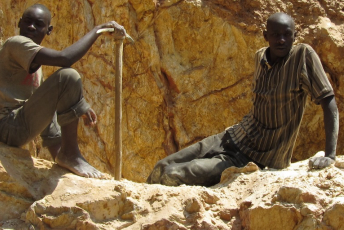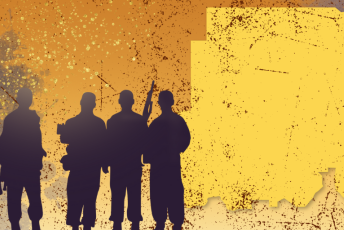Ghana, Africa’s largest gold producer, launched its first refinery in August this year. The raw gold will come from the artisanal mining sector mainly because large, predominantly foreign-owned companies supply gold mined in Ghana to refineries outside Ghana in countries such as the United Arab Emirates, Switzerland and India.
While the government relies on dividends and taxes from large companies, the small-scale mining sector provides direct support to local miners and fosters the gradual growth of Ghanaian-owned mining companies. There are over a million small-scale miners in Ghana supporting the livelihoods of over 4.5 million people. Small-scale, artisanal mining constitutes more than 35% of mining activities and is reserved only for Ghanaians with permits. However, it is estimated that over 85% of this mining is still conducted illegally.
Illegal mining, commonly referred to as ‘galamsey’ in Ghana, is a major driver of rapid land degradation, deforestation and health risks. This year, Ghana’s water regulator warned that the country may need to import water in the next five years due to galamsey along water bodies. Ghana is the world’s second-highest cocoa producer – but because of the galamsey cocoa farms are destroyed to make space for illegal gold mining sites. Such risks have driven calls for a total ban on all forms of artisanal mining.
In January 2022, Ghana’s government reduced the tax on gold from artisanal miners from 3% to 1.5% in an attempt to curb gold smuggling. This increased legal gold exports from the small-scale mining sector, but smuggling remains prevalent.
Operation Vanguard, a joint military and police task force established in 2017, conducted regular raids on sites, often arresting artisanal miners with poor education and resource backgrounds. Yet many interventions fail to target the highly resourced ‘sponsors’ behind galamsey. This includes local and foreign networks that purchase mining tools and negotiate access to lands with customary chiefs, taking advantage of the fact that 80% of Ghana’s land is held under customary governance.
While the government claims areas with huge mineral resources for public good, after compensating the traditional owners, there are still vast unclaimed lands open to illegal mining. This sometimes happens with the tacit approval of customary chiefs, who receive royalties from miners. Miners also operate in remote areas and national parks that customary and state authorities cannot monitor sufficiently.
Most of the illegally mined gold in Ghana is smuggled through clandestine networks to the United Arab Emirates. Ghana reportedly lost about US$1.1 billion in revenue from gold exports from 2019 to 2021. In Al Jazeera’s documentary Gold Mafia, Alistair Mathias, a Canadian citizen, claims to smuggle about US$40 million worth of gold out of Ghana every month for high-level state actors. This points to political interests and corruption as key to sustaining the illegal practice.
Foreign nationals from neighbouring countries and abroad exacerbate the situation. Several Chinese nationals have been arrested for running illegal mining operations, including recruiting local miners and introducing the use of heavy machinery on sites. But few are convicted. Most Chinese nationals who have been arrested are fined or deported.
A recent high-profile case involves Aisha Huang, a Chinese woman known as the Galamsey Queen. In December 2023, she was sentenced to four and a half years in jail and a US$4 000 fine. She’d been operating in Ghana since 2017 and had been deported several times, only to return to operating illegal mines. Her jail term is, however, less than the minimum of 20 years for non-Ghanaians involved in illegal mining, as provided for by the amended Mineral and Mining Act of 2019. This may be because Ghana wants to stay on good terms with China – its biggest foreign investor.
Unemployment has driven many miners in some northern areas to collaborate with and learn from more experienced miners from neighbouring countries. Ghanaians involved in galamsey at the Dollar Power, Accra and Dablakrou mining sites in Bui National Park, which straddles the Ghana-Côte d’Ivoire border told ENACT: ‘People from Burkina Faso and Cote D’Ivoire started mining in these areas first. When we learnt that they [were] finding gold, we moved there because it’s under Ghana’s soil.’
This initially led to disputes and clashes between Ghanaians and Ivorians. But these mining areas have grown into thriving and relatively cohesive multinational communities that include miners’ families and business people from Ghana, Côte D’Ivoire, Burkina Faso, Nigeria, Niger and Togo. However, because there is limited state presence here, the area has become a transit network for goods smuggling between Ghana and Côte d’Ivoire, and potential extremist exploitation is concerning.
A senior government official in Hamile said: ‘Extremists are already involved in fuel and fertiliser smuggling, arms trafficking and cattle rustling in northern Ghana, due to porous borders with Burkina Faso and Côte d’Ivoire.’ As more and more gold deposits are discovered in northern Ghana, it is likely that extremists could exploit the illicit mining hubs for resource mobilisation and recruitment. Some of these activities are conducted in collaboration with Ghanaians, who are unaware – or in denial – of the implications.
In April 2024, five Burkinabé were sentenced to 20 years for mining illegally in Ghana’s Upper West Region. State officials told ENACT that their arrest and imprisonment reflected Ghana’s growing concerns over the extremist threat from the Sahel. This concern has also been highlighted by National Security Minister Albert Kan-Dapaah, who said that terrorists would likely target illegal mining as part of their infiltration strategy in Ghana.
The government has recently become more interested in these communities in northern Ghana due to the area’s huge gold deposits and is exploring opportunities to regulate mining operations there. Since 2019, it has been implementing a community mining programme to prevent illegal operations, improve working conditions and employ community members.
However, the programme’s rollout has been slow, adding to claims that the process of attaining a small-scale mining licence is lengthy and arduous. In some areas where the plan has been rolled out, citizens say political interest in the scheme precludes inclusivity.
Ghana’s effort to end illegal gold mining must be accompanied by significant reforms to tackle corruption, weak enforcement measures and bureaucracy in the highly centralised licensing and management process. Government efforts to ensure greater inclusivity could include devolving these licensing and management processes to municipal and district assemblies, in cooperation with customary chiefs who understand the local context and own lands where illegal operations occur.
District assemblies and local chiefs are critical for the inclusive management and day-to-day monitoring of mining activities, including preventing foreign and extremist exploitation of mine sites in their backyards.
Investing in artificial intelligence technologies to map hotspots of illegal mining may also enable greater engagement with local leaders, and lead to identifying sponsors and disrupting operations. However, the success of such actions depends on the state’s willingness to stem political interference and provide employment opportunities for poor communities who resort to illegal mining as a source of livelihood.
Ndubuisi Christian Ani, Senior Researcher and Project Coordinator, ENACT, ISS
Image: Ndubuisi Christian Ani/ENACT








